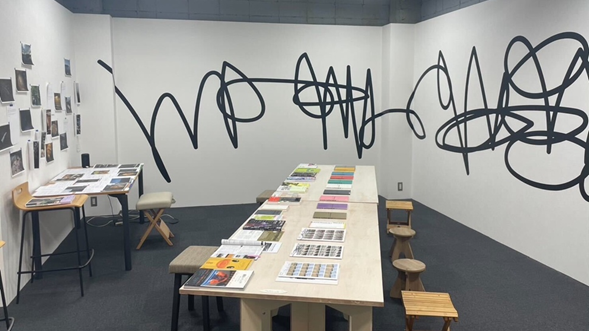EU Hosts New Residency for Art and Culture Critics in Japan

The Delegation of the European Union (EU) to Japan has launched "Critics in Residence @ Kyoto Experiment 2024" to explore the possibilities of criticism in culture and the arts during the international performing arts festival Kyoto Experiment 2024 (held 5-27 October). This initiative is organised by the Delegation of the European Union to Japan, operated by the Goethe-Institut Tokyo, and supported by Kyoto Experiment and the Saison Foundation.
Eight critics of culture and the arts, selected from over 100 applicants from across the EU’s Member States, will be invited to Kyoto for an interactive residency together with Japanese critics. The residency aims to provide a place for the critics to share their expertise and experiences, and to reflect together on the critiques that foster an environment of art and cultural policy, and on the role of culture and art in contemporary society. Various events, including symposiums, panel discussions, workshops, and feedback sessions, will be held during the duration of Kyoto Experiment 2024. There will also be opportunities for dialogue and exchange between the critics from the EU and Japanese critics selected by the Saison Foundation, which supports this program.
Given the current lack of residencies focusing on cultural and artistic criticism in Japan, Critics in Residence @ Kyoto Experiment 2024 seeks to explore the present and future of criticism in the country.
In recent years, the environment surrounding criticism and discourse has changed considerably, especially due to the profound impact of social media. In many parts of the world, print media such as newspapers and magazines, which used to serve as a central platform for criticism, are now facing a crisis of existence. Meanwhile, activities that take advantage of the expressive possibilities of digital spaces are on the rise. In this context, it is important to discuss the context in which culture and art criticism is situated and what possibilities it can open up.
Details of the residency program will be continually updated on the Kyoto Experiment website: https://kyoto-ex.jp/en/
About Critics in Residence @ Kyoto Experiment 2024
Dates: Saturday, 5 October–Sunday, 27 October
Organizer: Delegation of the European Union to Japan
Supported by: Kyoto Experiment, The Saison Foundation
Operated by: Goethe-Institut Tokyo
Profiles of participating critics from EU Member States (alphabetical order)
■ Luca Domenico Artuso, Italy
Luca Domenico Artuso is an Italian PhD researcher in Theatre and Intermediality at the University of Antwerp, Belgium. His research interests span from a primary focus on feminist and queer readings of Noh Theatre to Japanese Contemporary Performances. Since 2024, Luca's theatrical reviews have been published in collaboration with the Belgian magazine Etcetera, specialising in theatre and contemporary performance. Luca has previously served as specialist librarian at the Japan Foundation's Library in Rome (2019-2023). In 2018, he founded Gesshin, a Japanese Studies student association at the University of Venice (IT), a young hub for intercultural exchange between Italy and Japan. He is a member of the Performance Studies International Association.
■ Laura Cappelle, France
Laura Cappelle is a French arts writer, sociologist and dance scholar. She has been the Financial Times’ Paris-based dance critic since 2010 and a regular contributor to The New York Times since 2017, writing a column on French theatre as well as culture features. Additionally, she is an editorial consultant for CN D Magazine, a bilingual publication founded by France’s National Centre for Dance, and a mentor for Springback Academy, a European program for emerging dance critics.
An associate professor at Sorbonne Nouvelle University since 2023, she edited an award-winning French-language introduction to dance history, Nouvelle Histoire de la danse en Occident (Seuil, 2020), and co-authored its adaptation into a graphic novel (Histoire dessinée de la danse, Seul, 2024). She is also the author of Créer des ballets au XXIe siècle (CNRS Éditions, 2024) and has been an associate researcher with the CCN-Ballet de l'Opéra national du Rhin since 2022. Photo: Jérôme Panconi.
■ Freda Fiala, Austria
Freda Fiala is a performance scholar and curator. She is a fellow of the Austrian Academy of Sciences and studied Theatre, Film and Media Studies and Chinese Studies in Vienna, Berlin, Hong Kong and Taipei. Her work focuses on performance cultures in East Asia and intercultural relations. She curated the performance festivals The Non-fungible Body? and HYBRID BODIES at OK in Linz, Austria. She has taught performance theory at the Academy of Fine Arts and the University of Vienna and has published with DISTANZ Verlag, PAJ / MIT Press, Taipei Fine Arts Museum and Taipei Performing Arts Center, among others.
■ Tamás Jászay, Hungary
Tamas has been writing theatre reviews since 2003. For a long time, he did not choose a single style or aesthetic, but rather wanted to understand and feel everything connected to theatre. Over the years, his position as a critic has become both simplified and complex. On the one hand, he became interested in independent theatre initiatives, reflecting the boom in independent theatre in Hungary in the 2000s. On the other hand, as a theatre historian, he recognised that this was the last chance to enter into a dialogue with the creators of the stylistic endeavours of the 1970s and 1980s. Thirdly, as a curator and festival selector, he has also come into close contact with innovative, experimental forms. He regards the participation in the residency programme as a chance to bring the knowledge he has acquired into contact with the experience of a theatre culture that is very different from the European one. Photo: Vera Éder.
■ Michael Lanigan, Ireland
Michael Lanigan is the arts and culture reporter with the Dublin Inquirer. His work focuses on Dublin’s visual and performing arts scenes and examines the impact of government policy on the city’s culture and heritage. He also currently hosts the Dun Laoghaire-Rathdown Lexicon Library’s artist interview series, Walk and Talk. His writing has appeared in Vice, The Guardian, The Irish Times, Tokyo Weekender, Metropolis, The Business Post, Huck and Totally Dublin. He lives between Dublin and Kilkenny.
■ Santa Remere, Latvia
Santa Remere is the new Artistic Director of the New Theatre Institute of Latvia (NTIL) and curator of the International Contemporary Theatre Festival Homo Novus. She has a background in visual communication (Waseda University, Tama Art University in Tokyo). Since 2011, Santa has regularly published art reviews and for various Latvian and Baltic magazines, mostly with a focus on cultures of young audiences, contemporary theatre, and feminist topics. She is also one of the editors of the online culture magazine Satori in Latvia.
■ Aistė Šivytė, Lithuania
Aistė Šivytė is a professional critic of stage arts based in Vilnius, Lithuania. They have been working as a freelance stage arts critic for the past 5 years and written over 70 reviews and interviews about theatre, dance, contemporary circus and street theatre performances for various culture magazines, newspapers and internet portals.
■ Ilinca-Tamara Todoruț, Romania
Tamara Todoruț is a theatre critic, scholar, dramaturg, and translator based in Romania. She earned her doctorate from Yale School of Drama, and now teaches at the Faculty of Theater and Film at Babeș-Bolyai University. Her articles can be found in journals such as Theater, TDR: The Drama Review, Performance Research, Journal of Poverty, European Stages, and Theatre History Studies. She contributed to The Routledge Companion to Dramaturgy, and authored Christoph Schlingensief’s Realist Theater (Routledge 2022). She regularly collaborates with theatre publications such as Scena.ro and TheTheatreTimes.com, and served as Artistic Director of the 2023 International Online Theatre Festival (IOTF).
Japanese facilitators
■ Kosuke Ikeda
Born 1980 in Fukuoka, Japan. Graduated from the Graduate School of Fine Arts, Tokyo University of the Arts. Interested in the existence of matter and energy surrounding human beings, he works in a variety of media, including painting and installation. He also writes for critical journals and web media, and has directed the art space Jodo Fukugoh in Kyoto since 2019. He is the author of “In Search of Lost Things: Art in an Age of Uncertainty” (Sekishobo, 2019).
■ Naoko Kogo
Naoko has been interpreting, translating, documenting, and critiquing dance and performance between the Kansai region and the German cultural sphere since the 1990s. Currently in the Arts and Media course of the Graduate School of Humanities at Osaka University, she researches stage dances from over 100 years ago from perspectives including electrical technology, reproduction technology, labor gender. While focused on contemporary performing arts, she is also interested in the relationship between the media environment and the body, especially attempts of non-Western dancers to rewrite dance history/narrative in various media.
About Kyoto Experiment
Kyoto Experiment is a performing arts festival held in Kyoto since 2010. This year marks the fifteenth edition. Dedicated to producing experimental performing arts—both from Japan and overseas— the festival aims to bring the arts and society closer together through new forms of dialogue.
About The Saison Foundation
The Saison Foundation is a private grant-making foundation established by Seiji Tsutsumi (1927-2013). Since 1987, it has been providing grants for the promotion of contemporary Japanese theater and dance, and international exchange in these fields.
About the Delegation of the European Union to Japan
https://www.eeas.europa.eu/delegations/japan_ja?s=169
Media contact for this story
Kreab K.K. (PR agency), Akane Takahashi
Inquiries regarding Critics in Residence @ Kyoto Experiment 2024
Residence Coordinator, Haruna Hirano





